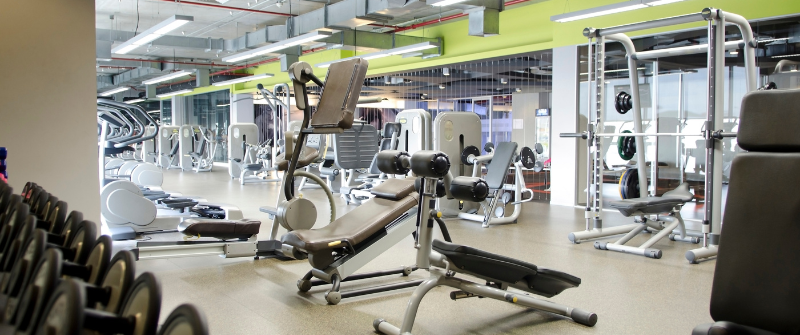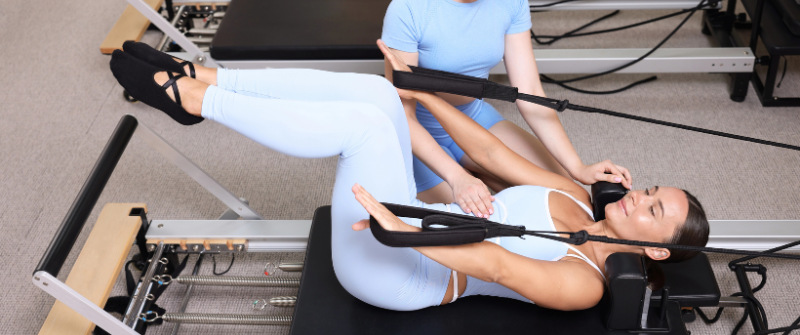
- by NEXO Team
- February 2, 2023
If you live and breathe just to pump iron and sweat your days away at the gym, why not use that passion to make money? There’s nothing more rewarding than taking what you love and turning it into a gym business. With the renewed focus on health, fitness, and wellbeing, the fitness industry is ripe with opportunities for those with the will, drive, knowledge, and resources to succeed.
It doesn’t take much experience or money to start a gym business, but it does take some strategic planning and the will and drive to navigate the industry as a startup. From business planning to securing financing and gym insurance, use this guide to get the lowdown on everything you need to know about opening a gym in 2023.
What’s covered:
- Develop a Business Plan
- Make Financing a Priority
- Choose the Right Location and Property
- Secure Permits, Licenses, and Gym Insurance
- Get Gym Credentials and Certifications
- Acquire Gym Equipment and Invest in Safety
- Hire Gym Trainers and Employees
- Develop a Solid Marketing Plan
- Key Takeaways
Develop a Business Plan
Come up with a professional plan that details every aspect of your gym business to give investors and financiers a clear view of why they should invest in or provide funding for your business. This plan is a breakdown of the services offered, daily operations, costs analysis, short and long-term goals, and profit projections and should outline how all funds will be managed.
You should also consider working with a business attorney to ensure all legal bases are covered. You never know when you might need their services should potential legal issues arise.
Make Financing a Priority
Don’t let the dream distract you from reality. The fitness industry is a billion-dollar industry, but in order to make money, you’ll need to invest enough capital to stabilize your gym business from the start. During the fledgling stages, it’s important to prioritize financing so you have more than just enough to account for incidentals or unexpected expenses.
There are many costs involved with starting a gym business and you need to have a definitive idea of what they are before you can even begin to secure funding. The first thing you’ll need to do is calculate your startup costs. Surprisingly, these aspects are also vital components of your overall startup costs.
Choose the Right Location and Property
Don’t sell yourself short on options while shopping for real estate for your gym business. The decisions you make have a long-lasting impact on your gym’s sustainability and success. Take time to consider multiple properties and locations. Perform due diligence to ensure you choose the right one for your gym business before you calculate your property costs.
Realistically, you should expect your property expenses to eat up much of your startup costs. You’ll need to decide if you’re going to rent or buy property for your gym business. Renting is cheaper than buying outright.
But the downside is lease payments increase your monthly operational costs. It really boils down to what you can comfortably afford initially and monthly. Keep in mind that larger spaces in prime locations cost more than smaller facilities in less accessible or desirable areas.
Secure Permits, Licenses, and Gym Insurance
Liabilities are often synonymous with accidents in the fitness industry. The key to protecting your gym business from liabilities is to secure all necessary permits, licenses, and credentials and a comprehensive gym insurance policy.
Because fitness centers are considered for-profit entities, most jurisdictions require owners to apply for a business license. Depending on your jurisdiction and the services you plan to offer, you may also need to secure permits to ensure your gym business is compliant with all zoning, licensing, and business regulation laws.
Don't just think short-term. If at some point you plan to offer amenities like saunas, hot tubs, steam rooms, pools, etc., you should check with your locality to ensure your facility and business is compliant now. If you don’t, you risk running into a bunch of red-tape and headaches later on.
From an insurance standpoint, it’s easier to start off with a policy that works for your gym business than it is to wait until something happens. No matter how small or large your business is or the number of members it’ll accommodate, gym insurance is necessary.
Be proactive about your coverage by screening insurers before purchasing coverage. Ideally, you want a gym insurer that is well-known and loved by its clients and offers everything from general and professional liability to vicarious and glass coverage and other generalized and specialized gym insurance products and services.
Get Gym Credentials and Certifications
Credentials and certifications are certainly not required unless you plan to niche down into a specialty like CrossFit. But it doesn’t hurt to earn different credentials and certifications from some of the fitness industry’s most trusted and respected health and fitness organizations and sources. In fact, the more credentials, and certifications you earn, the more reputable your gym business will be, which can give it a huge advantage over the competition.
You can’t go wrong with certifications from CrossFit, NASM (National Academy of Sports Medicine), AFAA (Athletics and Fitness Association of America), and ACE (American Council on Exercise).
Don’t forget to check with the local fitness organizations in your area for fitness and nutritional continuing education, enrichment, and certifications seminars. Of course, most are not free or have a nominal cost. Plan ahead and set aside a budget for credentials and certifications as well.

Acquire Gym Equipment
No matter how you look at it, you're going to need to acquire gym equipment. Since this often takes up a huge chunk of your startup costs, it’s necessary to be selective about what you get. Make sure any equipment you purchase, or lease fits the type of gym business you’re running.
Start with the necessities, such as cardio and stretching machines, weights, ropes, barbells, flooring mats, and basic specialized equipment for boutique gyms. You can always add more equipment later as memberships and profits increase. The goal is to make sure you don't end up overspending or getting equipment that’s not vital to your business’s needs.
Hire Gym Trainers and Employees
Take the time now and utilize the right resources to thoroughly vet candidates before hiring them. Don't let wages and payroll expenses be the driving factors in your hiring decisions. Novices and untrained candidates often have lower pay requirements than experienced professionals with certifications and credentials. But the caliber and level of services provided, and the culture created in the gym by more experienced fitness trainers and professionals are invaluable and help marketing to attract and retain more members.
Develop a Solid Marketing Plan
Before you open the doors to your gym, it’s vital to market your business to the public to attract members. Some useful tactics to help build interest in your gym business include:
- New member bonus
- Trial membership
- Discounts on training classes or nutritional services
- Advertise the benefits to each demographic of your targeted audience
- Advertise your gym’s mission and how it can help the local community and members personally
- Develop a strong online presence with a website and social media
- Unlock the power of promotional materials and workout gear to broadcast your brand
Don’t be a stranger, spend time in the facility and get to know members by name. Find out what their aspirations are, what they like and don't like about going to the gym in general and ask for recommendations about services or anything they’d expect or want to improve their gym experience.
Your marketing and advertising should broadcast the value and the various ways every aspect of your gym benefits members, regardless of where they are on their health and fitness journey.
Diversify your advertising strategies and keep things fresh. Network with other gym owners in the area and nationally for inspiration and guidance on how to incorporate proven, yet effective marketing elements to help build a name for your gym business.
Key Takeaways
If opening a gym is on your list of resolutions for the year, use the information above to guide your steps. For more fitness and CrossFit gym business information or resources, check out the blog at NEXO. To learn more about NEXO gym insurance products and concierge services, call 310-937-2007.
Categories
Fill out a short form to contact us with your questions or to receive a customized quote.
Recent Posts
-
 Injury Waivers Aren’t Enough: Insurance Gaps Jiu-Jitsu Owners Overlook
January 21, 2026
Injury Waivers Aren’t Enough: Insurance Gaps Jiu-Jitsu Owners Overlook
January 21, 2026 -
 How Gym Risk Management Can Lead to Lower Premiums Over Time
January 21, 2026
How Gym Risk Management Can Lead to Lower Premiums Over Time
January 21, 2026 -
 Why Combat Sports Gyms Pay More for Insurance and How to Control Costs
January 21, 2026
Why Combat Sports Gyms Pay More for Insurance and How to Control Costs
January 21, 2026 -
 Functional Fitness Injury Trends That Impact Insurance Underwriting
January 21, 2026
Functional Fitness Injury Trends That Impact Insurance Underwriting
January 21, 2026 -
 Why Pilates Studios Face Unexpected Liability Despite Being Low-Impact
January 21, 2026
Why Pilates Studios Face Unexpected Liability Despite Being Low-Impact
January 21, 2026
